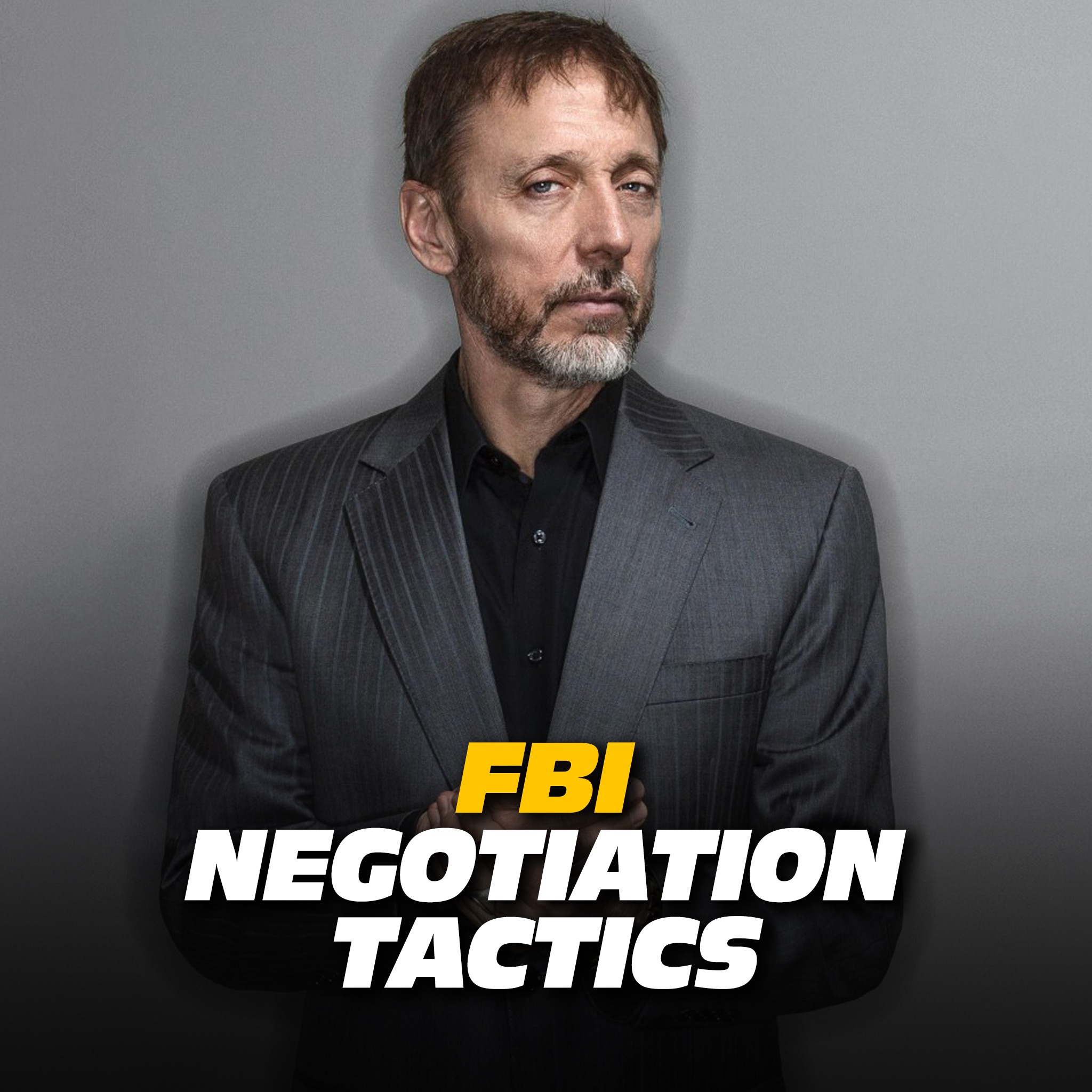Negotiation– it’s inevitable. In life, business, or in FBI hostage situations.
Negotiation is ironically non-negotiable. As long as there is conflict, whether good or bad, the need for negotiation skills is always present.
And that is why I am so excited to share this article with you! A while back, I had the privilege to sit down and interview Chris Voss- author, businessman, and former FBI hostage negotiator.
I am not lying when I say that his book, Never Split the Difference, is one of my top five favorite business books of all time. His stories will keep you on the edge of your seat, but his practical tips and application will leave you mind blown.
If you haven’t yet, I highly recommend picking up a copy and reading it for yourself!
But in case you don’t have the time to devote to reading an entire book, I’ve given an overview of our conversation here along with several of the best business negotiation tactics that you can begin to implement today!
Chris’s Background
Chris grew up in a small midwestern town in Iowa where his father owned his own business. Chris started working in the family business at a young age and learned two valuable lessons from his father.
First, when it comes to any job, you get up and get after it! There was no excuse for anything but a hard work ethic.
Second, every obstacle or situation was viewed as a chance to figure it out! According to his father, every issue was “figure-outable”. This taught Chris to be adaptable and inquisitive. 
These lessons would serve him well throughout his career.
At the age of 15, Chris saw a movie involving law enforcement and knew that was wanted he wanted to do. He had no idea where this desire would take him at the time, but he was determined to make it happen.
College and Entering the Bureau
His father made a deal with Chris that he would pay for four years of college. After that, Chris was on his own.
After college, his father suggested looking into the federal department rather than the state department. Partly because Chris’s father knew someone who was a Secret Service agent, and partly because he didn’t want the four year degree he paid for to go to waste.
So Chris spoke with the Secret Service agent his father knew, and once he told Chris that his job paid to send him around the world, Chris was sold.
As luck would have it, the Secret Service was not hiring at the time, but the FBI was.
Chris would spend his first few years in Pittsburgh and eventually end up in New York City. He absolutely loved the energy of the city and the people he was able to work alongside.
He was a part of the Terrorism Task Force but he dreamed of joining the SWAT team. This is where his career would take an interesting turn.
Rejection and the Negotiation Unit
An injury kept Chris from being able to join the SWAT team, and after seeing negotiation teams in action in New York, he went for it.
This is perhaps one of the biggest lessons to learn from Chris’s story that does not actually involve negotiation. He was rejected the first time he went out for the team because he was not qualified.
But rather than give up, he went to the agent in charge of the team and asked her what he needed to do to become qualified.
Following the Right Advice
Never take advice from anybody you wouldn't trade places with or if they're in charge of where you wanna be - Chris Voss Click To Tweet
In this point of our conversation, Chris stressed the importance of taking the right advice from the right people, and this statement of taking advice only from those you’d want to trade places with should be a rule of thumb for all advice you hear in life.
The agent in charge of the negotiation team told Chris to volunteer at the suicide prevention hotline to prepare for the negotiation team. Chris listened to what she said and did it.
Here’s the simple truth about advice- it’s only useful if put into action.

Chris followed the advice of someone who was in charge of where he wanted to be. And it paid off. After a year and a half of volunteering for the suicide prevention hotline, he joined the negotiation team.
Years later when Chris was writing his book, he approached the female agent to ask her permission to use her name for the story.
She told him that when he came back after heeding her advice, she was truly shocked. She had literally told a thousand people over the years to volunteer at the hotline, and Chris had been one of two people who actually did it!
In whatever field you are in, determine those whose advice you should listen to and then determine to apply it. Follow through!
The Suicide Prevention Hotline
During the time he volunteered for the hotline, Chris was able to quickly learn two valuable tools for his negotiation skill set.
While Chris felt like he already had a natural knack for negotiation, the suicide prevention hotline helped him learn how to develop influence with people quickly.

He also learned how to apply emotional intelligence. Emotional intelligence has twelve components, and one of the largest that Chris emphasized was empathy.
Empathy is the ability to understand and share the feelings of another. Later on in the interview, Chris gave some specific tips on how to implement empathy in negotiations, but before getting into that, it was important to establish the foundation that empathy is vital in any negotiation situation.
Whether it’s a hotline call, hostage situation, or a business negotiation, empathy saves time!
A Missed Opportunity and His First Negotiation Call
As Chris began his training for the negotiation unit, he quickly realized that it was much like what he did on the suicide prevention hotline only without a SWAT team. The advice the agent had given him now made complete sense.
The very first time Chris became aware of a negotiation case he did not go directly to the scene because he was not called. He heeded the advice given by a fellow agent. However, after the fact, he learned that he should have gone.
This missed opportunity taught him about self-initiative. He encourages everyone to step up whenever they see the need. Here’s the thing- people will always use your help even if it wasn’t asked for. You will never be discounted for showing up!
When his first official negotiation call came in, he felt ready. This was what he had trained for. In our interview, Chris said, “You don’t rise to the occasion, you fall to your highest level of preparation.”
Meaning, when duty calls, you can move forward with confidence because you can fall back on your preparedness. Realistically, while every call was unique, the mindset going into each call was the same- be prepared!
Teamwork and Harvard
I asked Chris if he had any stories of a time he felt outgunned and what he did to fix the situation.
What he told me was interesting. He said that while there were calls that obviously went south at some point, he wouldn’t say he felt outgunned. Why?
- His squad believed in a process.
- They prepared to the best of their ability.
- And went in working as a team.
When you work as a team, no one decision causes the fatal flaw. You succeed or fail as a team.
He told of a botched kidnapping case that caused him to take pause and think about his team’s process and preparedness. Hostages had been killed even though he felt like his team had done the best they could do.
And instead of pointing fingers and being satisfied, he decided to team up with professors at Harvard to learn even more about negotiation tactics. This is huge!
Even if you truly believe you have made the best decision, if the outcome is not what you want it to be, learn from someone else who may know more.
Why Harvard? The law enforcement training was practical. Harvard professors brought the philosophical viewpoint.
This relationship would benefit both parties as it gave the FBI fresh perspective on negotiation tactics and the academic community could learn from the years of experience the FBI had.
Tactical Empathy
Chris Voss retired from the FBI in 2007, and began his own company, The Black Swan Group. He now uses his negotiation skills to help businesses around the world.
One of the first tools he uses is tactical empathy.
See empathy is NOT sympathy. It’s not weakness, and it is definitely not an agreement.
Tactical empathy is hearing out the other party. Chris mentioned that often the quickest way to his point across in any situation is to let the other party talk it all out and clear their head so they could actually hear his reasoning.

Empathy is letting them know you actually hear them and understand what they said.
In any business situation, using tactical empathy will help save time in the overall negotiation because it will allow you to hear them out right away and it clears their mind for your response.
Emotional Labeling
Chris said that labeling is the most valuable skill in business negotiation. Being able to understand the emotion behind the other party can help you know where they are coming from.
An example of this Chris gave was the statement, “Seems like you’ve given this a lot of thought.”
After applying tactical empathy and hearing them out, you can use a statement like this to help you in labeling the emotion.
The key aspect of this statement is the fact that it is not a question. See, questions cause walls to go up. There is an element of defense that comes into play when you respond with a question.
But using a statement like “seems like you’ve given this a lot of thought” uses empathy to then open the flood gates to hear more about where they are coming from.
The purpose of statements like this is to get them talking without thinking. They begin thinking out loud, and you gather more information about their emotions and their mindset in this negotiation.
Importance of Tonality
The tone of your voice is crucial to get right in any negotiation. UCLA professor, Dr. Albert Mehrabian stated that 38% of communication comes down to the tone of your voice with only 7% being accounted for with actual words.
Chris gave an example of a simple question, “Does this work for you?” in three different tones. The tone and placed emphasis on certain words can make this question sound truly inquisitive or almost accusative.
Focus on your tone. We may not even realize how we sound so it may be beneficial to record all negotiations and listen back. Listen to recordings of your voice and how your tone comes across naturally.
All of these tactics build on each other. Using tactical empathy helps you to better label the emotions involved which in turn help you know how best communicate through tone of voice.
Pretty cool, huh?
Questions and Calibrated Statements
Here’s the secret behind successful negotiations- gain the upper hand by giving the other side the illusion that they have control of the situation.
This is done with how and what questions. Chris’s example in business is using the question, “How am I supposed to do that?” with deference. There’s that tonality again.
This gives the illusion to the other side that they have control of the negotiation, but in reality, this buys you time and allows you to set yourself up for better collaboration.
Negotiation is not a synonym for bullying so it is important in business to understand that you ultimately want to come to a conclusion that benefits both parties involved.
But in the case of a conflict, implementing these tactics can help you negotiate terms in your favor.
Bargaining Price
Perhaps one of the most common negotiation occurrences in business is over price.
Chris and his team at Black Swan Group tell all their clients the same thing- DO NOT CUT YOUR PRICE!

There are two reasons someone will want to haggle your price.
1- They are bored and enjoy the game of bargaining.
Or
2- They don’t see the value in what you are offering at that price.
So in negotiating price, determine which of the two you are dealing with. If it’s the first you can be quick to shut it down or point them in a different direction.
If it’s the second, then you will need to review your offer and truly see if the value is there, and if it’s not, make sure to add to it to keep it at the price you are asking.
When you are 100% confident that the value is worth what you are asking, then you can confidently turn down anyone who wants to haggle the price.
In business negotiations, Chris recommends looking at everything from your product, offer, implementation, and terms, but stand firm on your price!
Conclusion
Again, I cannot say enough how much I love Chris’s book, Never Split the Difference. Click here to get your copy.
It is an intriguing read, and it will do wonders for your personal negotiation skills.
Click here if you’d like to hear him talk about these tactics on my show.

Negotiation is non-negotiable. We will all face it along our personal and professional journeys. Let me know in the comments below which FBI tactic stood out to you and how you will be implementing it!
See you next week!




0 Comments